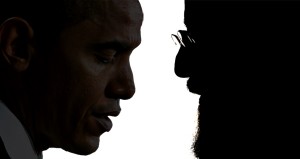 Obama administration praises 'welcome rhetoric' over nuclear weapons and says meeting is possible next week in New York.
Obama administration praises 'welcome rhetoric' over nuclear weapons and says meeting is possible next week in New York.
The White House has hinted at the possibility of a historic meeting with Iranian president Hassan Rouhani during his visit to the United Nations next week, praising what it called "welcome rhetoric" from Iranon nuclear weapons.
In the latest sign of a thaw in relations between the two countries, White House spokesman Jay Carney acknowledged "dramatic" shifts in Tehran's language but stressed the need to see it matched by actions.
On Wednesday Rouhani gave an interview to NBC insisting the country had no intention of putting its civilian nuclear programme to military ends and suggested he had political authority inside Iran to negotiate a solution to a standoff with the west over the programme.
Earlier, the reform-minded president also agreed to release a series of political prisoners, raising hopes in Washington that he was gaining traction over more hardline elements in Tehran.
The two developments produced a positive response from the White House on Thursday, but administration officials remain cautious about the extent to which he can act independently of Iran's surpreme leader Ali Khamenei.
"We obviously notice a significant change in language and tone, it's rather dramatic, but it's important we don't just take Iran's word for it," said Carney.
"The release of political prisoners is a welcome action. The welcome rhetoric over nuclear weapons is just that. Words are not a substitute for action and we need to see follow-through."
Both Obama and Rouhani will be in New York at the same time next week for the United Nations general assembly and hopes are rising that the two may meet to discuss what progress on nuclear weapons would be required for the US to lift its crippling sanctions regime against Iran.
Carney again hinted this was possible, but insisted the US had always been willing to talk to Iran about ending the alleged nuclear weapons programme. Asked if the two leaders would meet in New York, he replied: "We will see. It has always been possible."
He added: "The president has said all along that he would be willing to have that meeting providing that Iran demonstrates its seriousness in dealing with its nuclear weapons programme."
Next week's UN meeting is shaping up to be a crucial test of American foreign policy in the region, with the security council also due to discuss action over Syria's chemical weapons programme.
On Thursday, secretary of state John Kerry made an impassioned plea for the UN to stop debating whether Syria had used chemical weapons and move on to what to do about it.
In a sign that last week's deal in Geneva for Syria to hand over its weapons may not have been enough to overcome diplomatic opposition from Moscow, Kerry gave an unexpected press conference to press home the significance of the UN report on chemical weapons use in Damascus. "This fight about Syria's chemical weapons is not a game. It's real. It's important," said Kerry.
"Please. This isn't complicated. The security council must be prepared to act next week. Time is short. Let's not spend time debating what we already know," he added.
"We need to make the Geneva agreement meaningful."
By The Guardian
The Iran Project is not responsible for the content of quoted articles.

 QR code
QR code